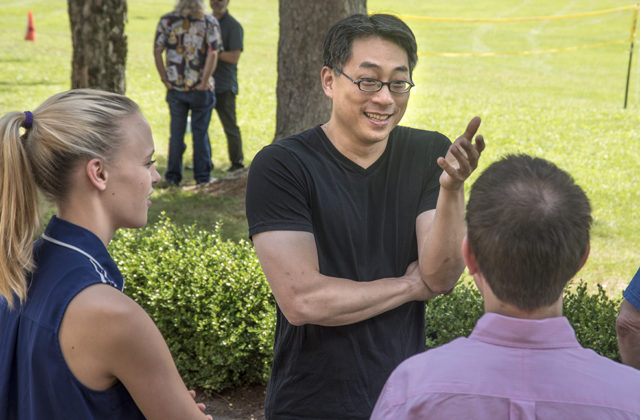Placing Classical Music Within a Wider Conversation
New Director at the Norfolk Chamber Music Festival
By Wiley Wood
Melvin Chen, the new director of the Norfolk Chamber Music Festival, talks about music in a distinctly down-to-earth way.
“Just like in a relationship,” he says to the young musicians who have performed a Franck piano quintet for him at a public masterclass, “there can be an upside to . . . how can I say this . . . to maintaining a certain level of mystery. Can you play with less clarity, less definition?”
The audience titters; the players look nonplussed. Yet over the course of the next 20 minutes, the piece gradually loses its shell of perfection, becomes more tentative, open, affecting. Everyone in the room feels it. “With an expressive piece like this,” says Chen, after listening to another quintet, “you don’t want to be the dog that pees on every hydrant.” The image registers, and the group responds by structuring its rendering of Dohnányi’s adagio more rigorously.
Chen became director last autumn when his predecessor, the slightly rumpled, highly accessible and much-liked Paul Hawkshaw, stepped down after 13 years. Chen has a restless, expansive presence and a polymath’s resume: born in Tennessee, he studied science and music at Yale, earned a Ph.D. in chemistry at Harvard, then a M.A. in piano and violin at Juilliard. He joined the Yale School of Music in 2012 as an associate professor of piano. He is also the school’s deputy dean.
Asked whether his scientific training feeds into his musical life, Chen says he sees no direct connection. At the same time, “it’s useful for any artist to think about things in many different ways,” says Chen. To the extent that his early pursuit of science made his mind more nimble and more open, he concedes, it may also have made him a better musician.
Chen takes seriously the Norfolk Chamber Music Festival’s role in training the next generation of chamber musicians. “Among the string quartets of my generation, 90 percent were at Norfolk at one time or another, “ says Chen. He cites the Saint Lawrence, Ying and Miró quartets, and points with pride at a group of 2016 Norfolk fellows, the Rolston String Quartet: “They won the Banff Competition right after they were here last year.” The Banff, which includes five rounds of grueling competition, awards the most prestigious string quartet prize in the world.
As part of an effort to recruit the most promising instrumentalists to Norfolk, Chen traveled the country earlier this year holding regional auditions. The Norfolk Festival’s long tradition and what Chen describes as Yale’s world-class faculty are a draw. “We are also making a concerted attempt to feature students alongside faculty at our Friday night concerts,” Chen says.
At the same time, Chen wants to make the classical repertory as accessible as possible to the concertgoer. He has programmed most of the Friday and Saturday night concerts around a theme, to provide an entry point to the music. And a series of preconcert talks by Yale professor Paul Berry, an exuberant and erudite speaker, precede the Friday night concerts.
The central figure around which the 2017 Norfolk Chamber Music Festival revolves is Antonín Dvorák, whose appropriation of African American melodies for his chamber and symphonic compositions in the 1890s, while on the faculty of the National Conservatory of Music in New York, is widely seen as the moment when the European classical music tradition took root in the New World.
Concerts have explored a variety of related topics. One examined the use of folk airs from the British Isles, juxtaposing Beethoven’s settings of Celtic tunes (“The Last Rose of Summer” and “Paddy Whack” among them) with a hair-raising horn quintet by the contemporary Scots composer James MacMillan, which features the bugling of a beleaguered stag. Others have investigated Brahms’s influence on Dvorak, Dvorak’s early use of Slavonic dances and Dvorak’s American period, including pieces by younger contemporaries he influenced, Charles Ives among them.
Is classical music relevant in the age of Twitter? Chen answers that great art is actually more important in today’s society than ever. Great music and great art help the mind deal with complexity, he says, which can be valuable at a time when people tend to jump to quick conclusions.
“A work may be not just happy or sad but have conflicting elements,” says Chen. “A piece may sound joyful but have great nostalgia. Life is this complicated series of things that’s not black and white, and art helps us be comfortable in that.”
The Norfolk Chamber Music Festival continues its regular schedule through Saturday, August 12, followed by the Yale Institute of Sacred Music Choral Festival on Saturday, August 19.
Photo by Bruce Frisch.

